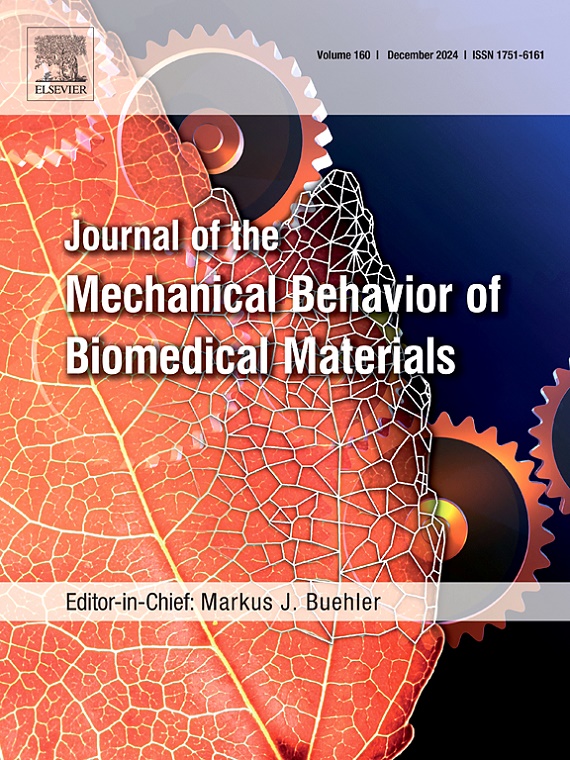Study on the lubrication behavior of tannic acid/ poly (vinyl alcohol) hydrogel enhanced by protein adsorption for articular cartilage applications
IF 3.3
2区 医学
Q2 ENGINEERING, BIOMEDICAL
Journal of the Mechanical Behavior of Biomedical Materials
Pub Date : 2024-11-23
DOI:10.1016/j.jmbbm.2024.106825
引用次数: 0
Abstract
Poly (vinyl alcohol) (PVA)-based hydrogels are widely regarded as ideal cartilage replacement materials because of their excellent properties. However, they have drawbacks such as high coefficient of friction (COF) and insufficient wear resistance. As important components of the synovial fluid, proteins are involved in counter-pairs and effect their tribological behavior via denaturation. Tannic acid (TA), which is rich in hydroxyl groups, can bind strongly proteins and change their conformation. In this study, the structure and lubrication performance of TA/PVA hydrogels in phosphate buffer saline (PBS) and bovine serum albumin (BSA) solutions were investigated. The results indicated that TA molecules enhanced the stiffness of the hydrogel by forming hydrogen bonds with PVA, reducing its COF in the PBS solution. In BSA solution, the tribological behavior of the PT hydrogels is altered by the BSA adsorbed at the hydrogel interface owing to the addition of TA. The COF of the PVA hydrogels with a TA content of 0.5 wt% is as low as 0.045, which was approximately 2.67 times lower than that of the PVA hydrogel under the same conditions. The benzene rings and hydroxyl groups in TA were connected to BSA molecules through hydrogen bonding, inducing a conformational change in the BSA from an α-helix structure to β-sheet structure, which further improves the lubricating properties of the hydrogel.
通过蛋白质吸附增强单宁酸/聚(乙烯醇)水凝胶在关节软骨应用中的润滑行为研究
以聚(乙烯醇)(PVA)为基础的水凝胶因其优异的性能而被广泛认为是理想的软骨替代材料。然而,它们也存在摩擦系数(COF)高和耐磨性不足等缺点。作为滑膜液的重要成分,蛋白质参与反作用,并通过变性影响其摩擦学行为。富含羟基的单宁酸(TA)能与蛋白质紧密结合并改变其构象。本研究调查了 TA/PVA 水凝胶在磷酸盐缓冲盐水(PBS)和牛血清白蛋白(BSA)溶液中的结构和润滑性能。结果表明,TA 分子通过与 PVA 形成氢键增强了水凝胶的硬度,降低了其在 PBS 溶液中的 COF。在 BSA 溶液中,由于添加了 TA,吸附在水凝胶界面上的 BSA 改变了 PT 水凝胶的摩擦学行为。TA 含量为 0.5 wt% 的 PVA 水凝胶的 COF 低至 0.045,比相同条件下的 PVA 水凝胶低约 2.67 倍。TA 中的苯环和羟基通过氢键与 BSA 分子相连,使 BSA 的构象从 α 螺旋结构转变为 β 片状结构,从而进一步提高了水凝胶的润滑性能。
本文章由计算机程序翻译,如有差异,请以英文原文为准。
求助全文
约1分钟内获得全文
求助全文
来源期刊

Journal of the Mechanical Behavior of Biomedical Materials
工程技术-材料科学:生物材料
CiteScore
7.20
自引率
7.70%
发文量
505
审稿时长
46 days
期刊介绍:
The Journal of the Mechanical Behavior of Biomedical Materials is concerned with the mechanical deformation, damage and failure under applied forces, of biological material (at the tissue, cellular and molecular levels) and of biomaterials, i.e. those materials which are designed to mimic or replace biological materials.
The primary focus of the journal is the synthesis of materials science, biology, and medical and dental science. Reports of fundamental scientific investigations are welcome, as are articles concerned with the practical application of materials in medical devices. Both experimental and theoretical work is of interest; theoretical papers will normally include comparison of predictions with experimental data, though we recognize that this may not always be appropriate. The journal also publishes technical notes concerned with emerging experimental or theoretical techniques, letters to the editor and, by invitation, review articles and papers describing existing techniques for the benefit of an interdisciplinary readership.
 求助内容:
求助内容: 应助结果提醒方式:
应助结果提醒方式:


